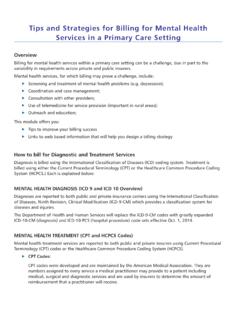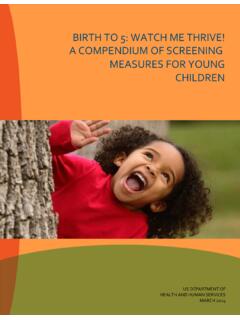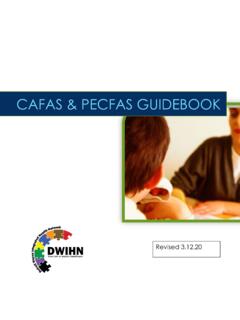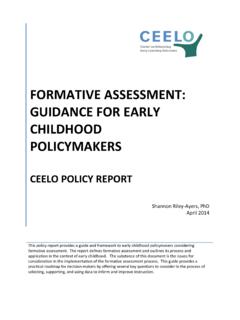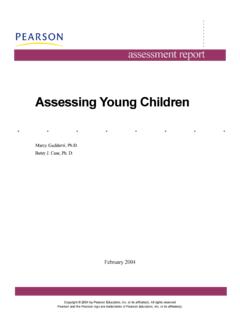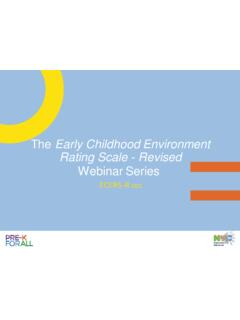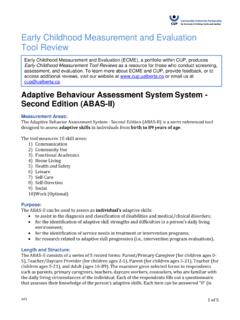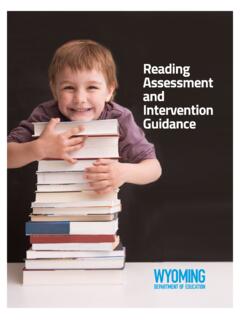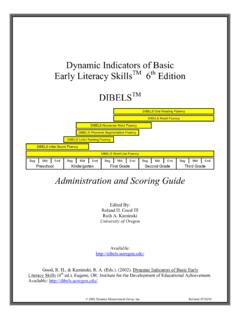Transcription of Logic Models and Outcomes for Early Childhood Programs
1 Report to the DC Children and Youth Investment Trust Corporation Logic Models and Outcomes for Early Childhood Programs By Jacinta Bronte-Tinkew, Julia Calkins, Project Director, Kristin Moore, September 17, 2001 Early Childhood Programs 2 TABLE OF CONTENTS Executive 3 Glossary of Outcome Measurement 6 7 7 What do we know about family-focused Programs , and why are they important for Early child development? .. 7 Prior research: A framework for assessing how parenting affects Early Childhood 9 What are the pathways through which parenting affects young children s development? .. 9 DC Children and Youth Investment Trust Corporation- Early Childhood Development 12 Early Childhood Development Conceptual 12 What parent and child Outcomes can be influenced by Early Childhood development Programs ?
2 13 Outcome Measurement .. 18 Early Childhood Development Logic Model - Analysis and 19 Summary, Integration and 20 Table : Summary Table of Early Childhood Programs of the DC Children and Youth Investment Trust 21 Figure : Conceptual Model of Child Development Program Outcomes for Children and Parents .. 24 Box : Summary of Outcomes for Parents and Children in Early Childhood Development Programs .. 25 Table : DC Children and Youth Investment Trust Corporation Early Childhood Development Logic Model .. 26 Table : Outcome Measures for Parents and Children in Early Childhood Development Programs .. 30 37 Early Childhood Programs 3 Executive Summary The primary purpose of this report is to provide revised Logic Models and measurable Outcomes for the Early Childhood Programs of the DC Children and Youth Investment Trust Corporation (DCCYIT).
3 The Logic model was revised from the initial draft of the Board of Directors of DCCYIT using the framework and terminology developed by the United Way Foundation of The report combines both an academic and applied research perspective on child development, and is intended to complement, not duplicate in any way, the work that has already been completed by the DCCYIT in this program area. The report focuses on Early Childhood Development and contains a brief overview of the research literature that informs our conceptualization of the Logic model and proposed Outcomes . We have taken this approach because we believe that the Outcomes derived from theory and basic research are important and using them in applied research will be helpful to the DCCYIT for performance tracking. The proposed Outcomes cover a range of domains.
4 We believe that the proposed Outcomes are important for child development, and are therefore appropriate for use in assessing program Outcomes . For example, much previous research has targeted cognitive ability and academic achievement as the sole indicators of healthy development during Early Childhood . Although we have included these Outcomes , we have taken a more holistic approach by including Outcomes in the physical, emotional and social domains. The most valid measures may differ by age and by the purpose of the program. This report can be used as a tool by individual Programs to determine which Outcomes and measures are most pertinent. We recommend that users and practitioners embrace modest expectations for some of these program Outcomes ; no single program strategy can accomplish all of the Outcomes that these Programs have been implemented to address.
5 Also, different Outcomes can be expected at different time points, but expectations should be tempered regarding immediate change for any one outcome. For instance, DCCYIT may expect Programs to improve parenting practices in Early Childhood Development Programs in the short term, but will probably not see improvements in children s cognitive functioning until a significant amount of time has passed. We urge Programs of the DCCYIT to track appropriate Outcomes in order to assess program effectiveness. This process should help to improve program quality. The Outcomes identified here are not exhaustive, and they can be measured in many ways. The indicators we have suggested range from simple to advanced assessments. What is easiest to document may not be the most meaningful and accurate measure.
6 In addition, outcome monitoring must take into consideration the issues regarding the collection of data from children of several ages. 1 United Way of America (1996). Measuring Program Outcomes : A Practical Approach. Alexandria, VA: United Way of America Press. See glossary of outcome measurement terms for details. Early Childhood Programs 4A large part of the decision regarding which Outcomes are monitored will depend on this factor as well as the cost associated with such an exercise. Early Childhood Development Programs These six Programs have diverse goals, but share a focus on the importance of children s Early years and on the pivotal role parents play in shaping children s lives. Some of the Programs include a home visiting component that allows home visitors to see the environments in which families live, gain a better understanding of families needs, and therefore tailor services to meet those needs.
7 Programs differ in their specific goals, the level of services that they offer and in the populations that they serve. They also differ in the onset, duration, and intensity of services. Some Programs begin during pregnancy, while others begin at birth or later. Programs last from weeks to years, and scheduled visits in the Programs that include home visiting range from weekly to monthly. We have recommended Outcomes for both parents and children in these Programs . Initial Outcomes primarily include changes in parents knowledge and attitudes. Intermediate and longer-term Outcomes encompass changes in parenting behavior and Outcomes , and in child Outcomes . Initial parent Outcomes include increases in knowledge in the following areas: The importance of prenatal care Child development milestones Parenting skills The importance of reading to children and other enrichment activities Child health needs ( , nutrition, immunizations) Safety practices in the home The importance of quality child care Services available for children and families in the community Intermediate/longer-term Outcomes for parents in these Early Childhood Programs include.
8 Regular prenatal care, resulting in the delivery of healthier children Consistent and reliable family planning Mental and physical health - Use of services to treat addictions and mental illness - Social and community support - Use of physical health services Supportive parenting and child-rearing practices Positive and nurturing home environment Children are not abused or neglected Utilization of service providers to coordinate services for children Early Childhood Programs 5 Intermediate child Outcomes are expected in the following domains: Cognitive development Language development Social and emotional development Physical health and motor development Longer-term child Outcomes are expected in the following domains: School readiness (includes the above components, plus approaches to learning) Improved school success at the end of kindergarten and first grade We have selected these Outcomes using a combination of theory and pragmatism.
9 The extent to which the DCCYIT seeks to use them for program tracking will ultimately depend on the cost associated with such an exercise. Many of these outcome measures have established validity and reliability and are some of the best in the field. They are also sturdy enough to provide guidance to the practitioners of DCCYIT funded Programs who wish to use them for assessment. Early Childhood Programs 6 Glossary of Outcome Measurement Terms2 Inputs are resources that are dedicated to or consumed by Programs . Examples include facilities, staff time, volunteer time, money, and supplies. Inputs also include constraints such as laws and regulations. Activities are what the program actually does, using inputs, in order to fulfill its mission. For example, providing classes for parents in order to disseminate knowledge/information about effective parenting skills, or providing after school activities for youth.
10 Outputs are the direct products of program activities. They are usually measured by the amount of work accomplished, for example, the number of parenting skills classes taught, or the number of youth who participated in after school activities. Outcomes are benefits for the people served by the program during or after participation. Outcomes include changes in knowledge, skills, attitudes, or behavior, and can be divided into three categories: Initial Outcomes are the first changes for participants, and are very closely influenced by the program. Initial Outcomes are often changes in knowledge, attitudes, or skills. For example, an initial outcome of participation in a parenting class might be the knowledge that reading to young children is important. Intermediate Outcomes are the step between initial Outcomes and longer-term Outcomes .
